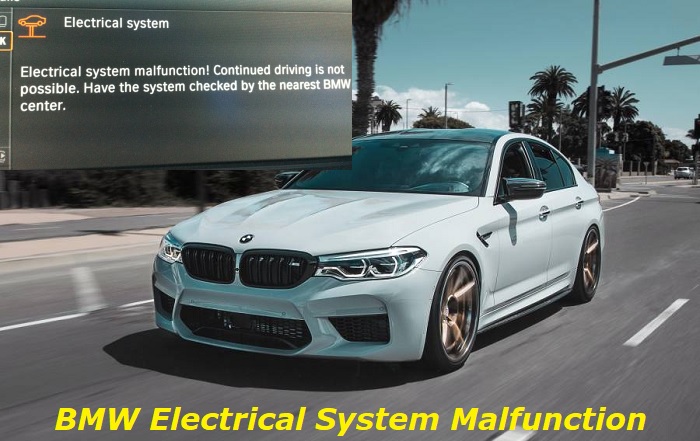BMW cars are renowned for their posh looks, grand appearance, and luxuriant interiors. Like other cars, modern-day BMW cars come with more electricity-reliant appliances and gadgets. Everything is automatic and needs electric power, from the door locks to the almighty transmission. It's not surprising, therefore, that these days, BMW cars come fully equipped with state-of-the-art electrical systems.
Electrical system malfunction message highlights
- Common reasons:dying battery, blown fuses, water damage, electrical issues
- How to fix:check the battery, check fuses, find a good BMW electrician
- Possible consequences:issues may get worse, car may refuse to start
- Priority level:High
- Can you drive?Yes, if it starts
- DIY repair:Possible but complicated
- Repair price range:$200-$1,000

Symptoms of BMW Electrical System Malfunction
First of all, you will see "Electrical System Malfunction" message on your dash. This will help you see that something is wrong with the vehicle. But your BMW will not always send you this message once something bad happens, so you should know about other symptoms to figure out and solve the problem.
Your BMW car gets its electricity supply from the joint work of the battery, starter, and alternator. These are independent yet interconnected components that define the workability of our BMW. Imagine what becomes of the numerous electrical components installed in your car if there is no electricity.
The battery is the 'power strong house' which supplies the current that all electrical components need, including the starter, the engine, and the fuel system.
However, the starter cranks the engine to life, though it all starts from the ignition. While your engine is running, the alternator steps in and reroutes current back to the battery to recharge it and save it from becoming depleted.
If you notice any of the below issues, your BMW may have an electrical system malfunction.
- Difficulty starting your car
Despite what you may think, it's not every time your car refuses to work that you can put it down to a mechanical problem. It might just be electrical.
Let's connect the dots.
Your car engine cannot start without a functional starter. Meanwhile, the starter cannot work without a viable supply of electricity. Thus, whenever the starter experiences an electrical system malfunction, the odds are that your car fails to start.
You'll experience the same problem when the battery is too weak or flat.
- Lights start flickering
All the bulbs in your BMW car thrive on the power supply from the electrical system. Your car has electrical circuits consisting of wires, fuses, and switches. Some electrical components wear and tear. In such situations, closing or opening the doors may interfere with electricity supply channels, and flickering may result.
A frail wire or broken switch may potentially cause lighting system problems. It may get worse and cause a total blackout. Electric circuits have switches and fuses to make fixing their problems easy.
So, when next you notice a flickering light, point the accusing finger first to the electrical system.
- Perceivable burning-plastic odor
Think of the electrical system when you perceive a burning-plastic smell in your car. It may be under the hood or inside the car. The source does not matter. At least, we already know that electrical cables are more likely to catch fire than any other wire. It may be due to overheating or overworking of some components.
- Fuse blows out intermittently
Experiencing constant fuse trips or cut-out fuses is a sign of a possible electrical system malfunction. The fuses are within the electric circuits to protect your electrical devices. When an electrical system malfunction causes the supply of a too-high current, the fuse blows out instead of allowing it to 'roast' your gadgets.
- Battery warning lights on
A critical electrical system malfunction may cause the battery warning lights to come on. This is the most obvious sign of a car's electrical system problem. However, you need to know that lights coming on does not automatically mean the problem is with the battery. It could very well be a problem with the alternator. What is certain is that there is a battery charging problem.
Reasons for BMW Electrical System Malfunction
- Failed Spark Plug
Your electrical system will start malfunctioning if your BMW experiences a failed spark plug. Your BMW has an internal combustion engine, so it needs spark plugs to function. For your car, a failed plug means suffocation.
Your car needs fuel to function, but, in reality, it does not need this fuel in liquid form. What happens is that air and fuel combine in the cylinder and transform into an air-fuel mixture. This mixture burns within the combustion chamber to produce the thermal energy required by the engine to produce torque. But no burning/ignition will occur except spark plugs receive and create sparks from the ignition coil-sent electrical signals.
An electrical system malfunction invariably arises when spark plugs fail to do their part. It's not uncommon for your car to misfire, accelerate poorly, or consume fuel excessively.
- Bad/Failing Alternator
The alternator is supposed to keep your battery continually charged while you drive. When your car engine works, electrical energy is generated, which the alternator converts into electrical energy. This energy is the direct current that the whole of your electrical system relies on. It does not end there; it's still the same alternator that keeps your battery from getting drained by continually charging it.
Now, all this happens when everything works fine.
A full-fledged electrical malfunction plagues your BMW when the alternator starts failing or goes bad. Even though your car may start, it will go off very soon. The headlights may become extremely dim. In serious cases of a bad alternator, the battery may get discharged and 'stone dead.'
- Dead Battery
As mighty as an alternator's job is, it will be rendered useless without a charged battery. A car with a dead battery will not start, let alone move. We can safely say that a dead battery is the peak of BMW's electrical system malfunction.
- iDrive System Problem
Your BMW car probably has an iDrive System Unit. Depending on your car, different generations of iDrive, such as NAV, MASK, CHAMP, CCC (Car Communication Computer), CIC, etc., are in use. Whatever the generation of iDrive on your car, they all perform the same function: ease of navigation.
When your BMW iDrive, in charge of communication and entertainment in your car, develops any problem, it may result in an electrical system malfunction. The most obvious manifestation of this is that the LCD in the dashboard may be blinkering or going blank. At times, the iDrive fan may remain perpetually on and drain the battery.
- Faulty Wiring
The battery generates, and the alternator converts it to usable current (DC) for the electronic components in your car. But for the current to get to these components, a functional wiring network is required. Bad or faulty wiring practically cuts off the power supply to components that need it. This development can lead to a series of electrical system malfunctions.
- Blown Fuse
Your BMW comes with fuses that protect the electric circuits from high currents. When a fuse blows up, it leaves an opening in the circuit, which means there is a discontinuation in power flow. Know that the car may not start if the blown fuse is mega.
Solutions to BMW Electrical System Malfunction
The solutions to your BMW electrical system depend on the cause of the problem. Let's highlight some of them.
If, for instance, your battery is dead because you left the headlights on overnight, all you need is to jumpstart your car, and the alternator will do the rest, fixing your battery for good. You can also choose to use a battery charger or get a battery booster pack.
However, in the case of a damaged battery, replacement is the only solution.
On the other hand, a failing or bad alternator needs the attention of a mechanic. The mechanic may repair or replace the faulty alternator, depending on the level of damage. As for repairing an alternator, you can also DIY it following instructions in the manual - but that's only advisable if you've gotten some hands-on electrical training.
Cleaning out soot or oil off the spark plugs may be all required to blow a new lease of life into your spark plugs. Yet, you need to know the root cause so the problem can be dealt with once and for all. A mechanic is in the best position to help you troubleshoot, identify, and fix this problem.
iDrive problems can appear complex because they are computer software and hardware related. Make sure to take your BMW car in for a check as soon as you suspect an iDrive-related electrical malfunction. Electrical system malfunctions caused by iDrive issues often require the services of a skilled technician to fix them.
As for BMW electrical system malfunctions, you can handle these yourself. You can replace damaged wires or fuses. But don't forget that another problem could have been responsible for burning wires or blown fuses. Take precautions and visit a mechanic workshop if you doubt what to do.
Final Thoughts
Generally speaking, BMW electrical system malfunctions are in most cases non-serious, and you can easily fix them. The most important thing is to be responsive to your car so you can detect any of these malfunctions on time. Electrical system faults attended to in time have higher chances of being fixed successfully.
About the authors
The CarAraC research team is composed of seasoned auto mechanics and automotive industry professionals, including individuals with advanced degrees and certifications in their field. Our team members boast prestigious credentials, reflecting their extensive knowledge and skills. These qualifications include: IMI: Institute of the Motor Industry, ASE-Certified Master Automobile Technicians; Coventry University, Graduate of MA in Automotive Journalism; Politecnico di Torino, Italy, MS Automotive Engineering; Ss. Cyril and Methodius University in Skopje, Mechanical University in Skopje; TOC Automotive College; DHA Suffa University, Department of Mechanical Engineering






Add comment